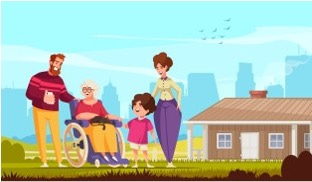The effects of helping and supporting an adult who experienced harm in the NHS and/or social care
Published in Healthcare & Nursing and Education
What is the study is about?
Almost all of us have experience using the NHS or social care. For many, it is a positive experience. The NHS and social care services aim to provide safe care, however some patients and service users experience physical or psychological harm. Sometimes this is the result of something going wrong with their care and sometimes this is from not being able to access timely or appropriate care.
When this happens, many people talk about their harm experience to friends and family and may need to ask them for (more) help and support. Sometimes these friends and/or family become unpaid or informal carers, although they do not always recognise this. Sometimes, these friends and/or family have already been in a caring role before the harm happened.
Little is known from research studies about how unpaid carers are impacted by such harm, nor about how they support their family member or friend afterwards.
Researchers in health and social care are often asked “what do you mean by an informal carer? I am just their friend / partner / parent / etc.” By ‘carer’, we mean people who provide physical or mental or emotional support to a family member or friend without being paid. It could be that the person has a long-term condition and for example needs pushing in a wheelchair on a permanent basis, or it could be that someone has slipped and broken a leg and needs someone to drive them for a short period. Both would be examples of unpaid carers, as would friends or relatives that support people with long-term conditions such as dementia.
In this study, we are interested in talking to people who provided support before the person was harmed and people who may have only started providing support as a result of the harm.
Why is this study important?
As it is common for people who are harmed to turn to family members or friends, carers are likely to play a key role in supporting and/or driving actions, and decisions, in the aftermath of harm. This includes whether to take formal action such as make a complaint, or to litigate. In instances where the person who was harmed cannot speak for themselves (such as when there are language barriers, cognitive problems, learning disabilities, or the person was too severely harmed) carers can play an important role as advocate and potentially as primary decision-maker in the aftermath of the harm.

Carers’ wellbeing may also be impacted by the harm. Carers may also have their own motivations for actions such as to protect against long-term impact on their well-being. To date, relatively little research has been conducted on the carers’ unique perspective into patient and service user harm.
Who are we going to talk to and how?
Some people may not consider themselves to be carers, but rather friends or family just doing what a friend or family member would, but we are still interested in hearing their perspective. We will talk to people who contact us to say that they are interested in the study and confirm that they are eligible to take part. To ensure that people remember as much detail as possible, we will talk to adults who support an adult who was harmed and where the harm occurred less than five years ago.
We will use what we refer to as a “qualitative” approach, which means that we will conduct interviews and ask open-ended questions about their experience and views. To decide which questions we should ask, we searched for any similar previous research and we obtained feedback on our questions from people with lived experience of caring and harm.
We would like to talk to 30 people, with as widely as possible ranging experiences, geographical locations in England and backgrounds. We will then reflect carefully on what people have said and look for common themes, where people have said similar things or shared similar experiences. We will also look to see if people have different perspectives about some things.
We will share the study findings with other researchers, policymakers and people working in health and social care, as well as any participants who ask for it. We will make recommendations on how the NHS and Social Care can better consider the experience of carers after harm and support them in their actions and decisions. This will help form better ways of responding and supporting family and friends after harm. Being academics, we will also publish our findings in scientific journals.
Who is conducting the study?
The study is being carried out by Associate Professor Michele Peters and Dr Siabhainn Russell at the University of Oxford and Dr Stacey Rand at the University of Kent. It is supported by two Patient and Public Involvement and Engagement advisors.
How do I find out more information about this study?
To find out more about the study, or perhaps even take part, please take a look at the study website https://www.qso.ac.uk/carers-outcomes/ or you can access the information sheet via this QR code

Funding and disclaimer
This research is funded by the National Institute for Health and Care Research (NIHR) Policy Research Programme, conducted through the Quality, Safety, and Outcomes Policy Research Unit (NIHR206117). The views expressed are those of the author(s) and not necessarily those of the NIHR or the Department of Health and Social Care.
Follow the Topic
-
ISRCTN: The UK’s Clinical Study Registry

A primary clinical trial registry recognised by WHO and ICMJE that accepts studies involving human subjects or populations with outcome measures assessing effects on human health and well-being, including studies in healthcare, social care, education, workplace safety and economic development.


Please sign in or register for FREE
If you are a registered user on Research Communities by Springer Nature, please sign in